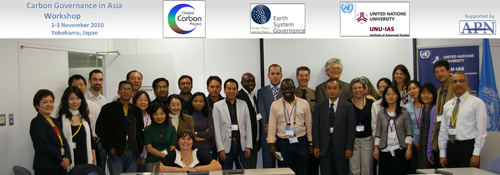Asia is a key region that is rapidly growing economically. Asian contribution is already dominating the global carbon emissions. It will play a greater role in global carbon management in the foreseeable future. However, within Asia, huge differences in welfare, governance systems, and carbon emission trajectories exist and thus pose a carbon governance challenge.
A better understanding of the carbon management challenges across multiple scales is necessary for Asia, which is less understood as of now. Such understanding will provide important insights to design an optimised carbon governance structure. In order to address this, a Capacity Building Workshop on Carbon Governance in Asia: Bridging Scales and Disciplines were held in the Institute of Advanced Studies of the United Nations University (UNU-IAS), Yokohoma, Japan on 1-3 November 2010.
The workshop, which was funded by APN with Reference Number CBA2010-04NSY-Dhakal under the Scientific Capacity Building/Enhancement for Sustainable Development in Developing Countries (CAPaBLE) Programme, brought together leading scientists from multiple disciplines from United States, Australia, Japan and China, policy-makers, local and national government agencies, international organisations, and young researchers in the Asia-Pacific region to discuss the challenges and opportunities for carbon governance in Asia.
The workshop was organised by the Global Carbon Project (GCP), Earth System Governance Project (ESG) of the International Human Dimensions Programme on Global Environmental Change (IHDP), and United Nations University-Institute of Advanced Studies (UNU-IAS) which were represented by Dr Shobhakar Dhakal, Mr Ruben Zondervan, and Dr Jose Antonio Puppim de Oliveira, respectively. On behalf of the APN, Mr Tetsuro Fujitsuka provided welcoming remarks and Ms Kristine Garcia gave a short presentation highlighting the opportunities that the participants could benefit from and the past and ongoing collaborations among APN and the workshop organising institutions.
Workshop Objectives and Structure
The workshop was structured with plenary and working group sessions. The plenary session was ordered as follows: (1) Introduction on Governance and Carbon Management; (2) Governance and Carbon Management; (3) National Regimes on Carbon Management; (4) REDD Regime in Carbon Governance Context; (5) Climate Change Sociology and Network Analysis; (6) International and Sub-national Regimes on Carbon Governance; (7) Policy Maker Perspectives; and (8) Reports from Working Sessions. On the other hand, the working group session was divided into two main groups with three sub-topics for each group. Working group 1 focussed on Mechanisms and Frameworks for Carbon Management with sub-topics: a) REDD and Carbon Governance; b) REDD and Community Forest Management; c) Frameworks to Manage Carbon in Asia. Working group 2 tackled Institution and Building Analysis focussing on a) Carbon Governance; b) Network and c) Transition to Low Carbon Economies.
Dr Dhakal, Executive Director of GCP provided a brief workshop overview and explained the objectives and framework to the participants prior to the main workshop sessions. The overall aim of the workshop is the capacity building of Asia-Pacific young researchers and to discuss the issues and opportunities for carbon governance for developing low carbon societies in Asia. Specifically, the workshop aimed to: (1) bring together leading Asian-Pacific researchers from various natural- and social sciences to stimulate dialogue and initiate disciplinary synergies toward sustainable development; (2) initiate the implementation of the Flagship Activity on Earth System Governance and the Climate System as developed by the ESG Project of IHDP and the GCP and outlined in the ESG Project Science and Implementation Plan; and (3) stress the importance of multi-level governance of carbon including actors such as cities and municipalities in designing an optimised carbon governance regime.
Leading scientists and guest speakers made presentations during the plenary sessions. Selected early career researchers on their potential to become future academic leaders in the region were provided with an excellent opportunity to present their research and receive feedback and support from established experts. The workshop also brought them in contact with the regional and global research communities and projects to explore future collaborations.
Key Message
A key message from the workshop is that pathways of regional development are sequences of interrelated changes in social, economic and governance systems. They vary from place to place and over time, are based on different drivers and problem perceptions in ways that are likely to have different consequences on how carbon governance is being shaped. Carbon governance takes place at the local, national and regional levels and between these levels.
Thus, it is a multilevel governance challenge that includes actors and agents at all levels. These actors are increasingly non-state actors like environmental advocacy groups, businesses, and scientific networks. The workshop emphasised that this multilevel characteristic requires a better scientific understanding and political awareness of norms and standards in carbon governance. Norms that are compatible between levels and policy domains while in parallel reflect that carbon governance is embedded in different cultural, social, economical, and political contexts.
The Workshop which was held prior to the Asia – Pacific Economic Cooperation (APEC) meeting held in the same venue wrote a summary and message to APEC Meeting. Full versions of the message as well as the proceedings are available from this link: http://www.gcp-urcm.org/CG/HomePage.
